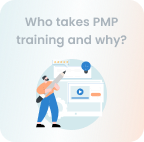







 10 Sep 2024
10 Sep 2024



Leadership, strategy and execution - This trio governs the world of Project Management, where you can be part of elite professionals shaping the future one project at a time. The PMP Certification is ideal to help you achieve precisely that. This blog takes a deep dive into What is PMP Certification and explores its benefits, the steps to achieve it and the exam details. Read on and turn your managerial dreams into reality.
Table of Contents
1) What is PMP Certification?
2) PMP Certification Benefits
3) How to Get Your PMP Certification
4) What's on the PMP Exam?
5) Conclusion
The Project Management Professional (PMP) certification acknowledges candidates skilled at managing the processes, people, and business priorities of professional projects. PMP was created by the Project Management Insitute (PMI), the world’s leading authority on Project Management. The goal is to recognize Project Managers who have proven project leadership experience and expertise.
To earn this certification, a Project Manager must fulfil certain criteria and pass a 180-question exam. The PMP exam was designed by project leaders and, as such, aligns each question with real-world Project Management scenarios. This ensures relevant practical applications.

The main benefits of a PMP Certification includes:

1) Nurturing core Project Management skills
2) Offering a structured framework on how to manage projects
3) Providing professional clout in the Project Management industry
4) Opening doors to Cross-functional and cross-industry opportunities
5) Enhancing your potential for a raise or promotion
6) Helping you be part of a large professional network
Elevate your Business Analysis skills in our PMI-PBA® Certification Training - Register now!
The PMP Certification is crucial for any aspiring Project Managers. The following steps will guide you towards earning this prestigious certification.
Before taking the PMP exam, you’ll have to ensure you’re eligible. You have two options:
1) 35 hours of Project Management course training with at least 36 months (about 3 years) of Project Management experience if you have a four-year degree.
2) 35 hours of Project Management course training with 60 months (about 5 years) of experience if you have a high school diploma or associate degree.

Keep track of your projects and training, recording your specific role, responsibilities, and project lengths so you have them at hand when you apply. The training requirement can be waived if you have a CAPM certification.
Make an account with PMI and start applying for the PMP exam. This will entail sharing basic personal information like your educational background and details on the projects you’ve worked on. Once approved, you must pay the exam fee and schedule a test.
Do you want to enhance your knowledge and skills in Agile methodologies? Sign up fr our comprehensive PMI-ACP® Certification Training now!
This is when you train for the exam through coursework or on your own. Several exam prep providers recommend spending 60 to 120 hours (about 5 days) studying. This process can take several months, depending on the frequency of your study.
You can take the exam online or at a testing site near you. It takes just under four hours to complete and consists of 200 questions.
The PMP Certification stays valid for three years. During that time frame, you must spend 60 hours (about 2 and a half days) on professional development activities to maintain the certification. Otherwise, you must sign up to retake the exam.
The PMP exam consists of 180 questions, and you’ll have 230 minutes (nearly four hours) to complete the test. The exam content encompasses agile, predictive, and hybrid approaches across the following three domains:
1) Process (50%)
2) People (42%)
3) Business environment (8%)
If you don’t pass the test the first time, you can retake it up to three times in a single year.
Earning a PMP Certification is a big step towards unlocking fresh career opportunities in the dynamic world of Project Management. Understanding what PMP Certification is essential for aspiring Project Managers. As this blog shows, this certification will equip you with proven expertise and global recognition in this challenging but rewarding field.
Elevate your Project Management skills the right way – Sign up for our comprehensive PMP® Certification Course now!






© Copyright 2017. All rights reserved. Contact: PMP® TRAINING ACADEMY.
